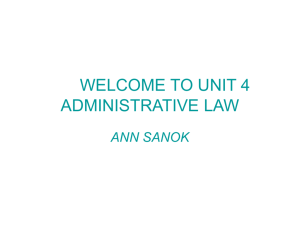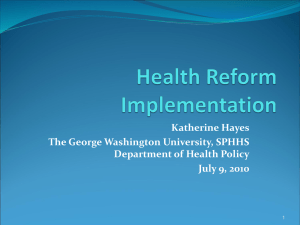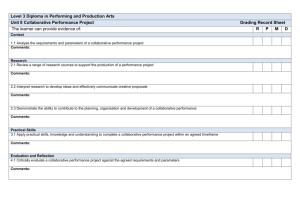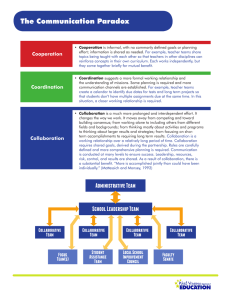Collaborative General Introduction Sponsoring Organizations
advertisement
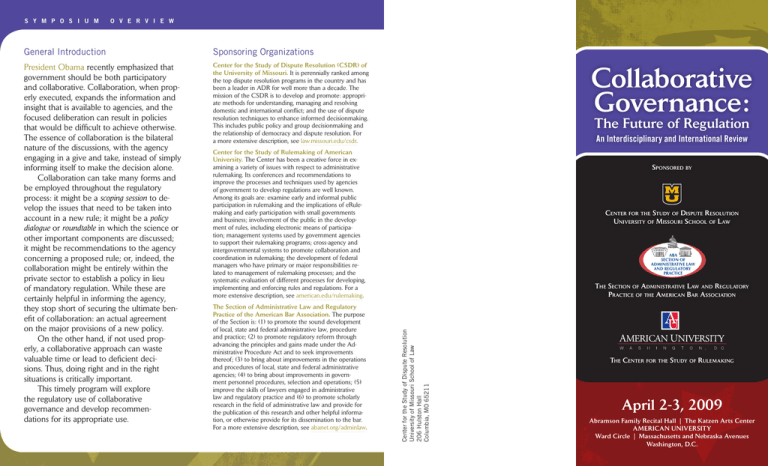
O V E R V I E W General Introduction Sponsoring Organizations President Obama recently emphasized that government should be both participatory and collaborative. Collaboration, when properly executed, expands the information and insight that is available to agencies, and the focused deliberation can result in policies that would be difficult to achieve otherwise. The essence of collaboration is the bilateral nature of the discussions, with the agency engaging in a give and take, instead of simply informing itself to make the decision alone. Collaboration can take many forms and be employed throughout the regulatory process: it might be a scoping session to develop the issues that need to be taken into account in a new rule; it might be a policy dialogue or roundtable in which the science or other important components are discussed; it might be recommendations to the agency concerning a proposed rule; or, indeed, the collaboration might be entirely within the private sector to establish a policy in lieu of mandatory regulation. While these are certainly helpful in informing the agency, they stop short of securing the ultimate benefit of collaboration: an actual agreement on the major provisions of a new policy. On the other hand, if not used properly, a collaborative approach can waste valuable time or lead to deficient decisions. Thus, doing right and in the right situations is critically important. This timely program will explore the regulatory use of collaborative governance and develop recommendations for its appropriate use. Center for the Study of Dispute Resolution (CSDR) of the University of Missouri. It is perennially ranked among the top dispute resolution programs in the country and has been a leader in ADR for well more than a decade. The mission of the CSDR is to develop and promote: appropriate methods for understanding, managing and resolving domestic and international conflict; and the use of dispute resolution techniques to enhance informed decisionmaking. This includes public policy and group decisionmaking and the relationship of democracy and dispute resolution. For a more extensive description, see law.missouri.edu/csdr. Collaborative Governance: The Future of Regulation An Interdisciplinary and International Review Center for the Study of Rulemaking of American University. The Center has been a creative force in examining a variety of issues with respect to administrative rulemaking. Its conferences and recommendations to improve the processes and techniques used by agencies of government to develop regulations are well known. Among its goals are: examine early and informal public participation in rulemaking and the implications of eRulemaking and early participation with small governments and business; involvement of the public in the development of rules, including electronic means of participamailer tion; management systems used by government agencies to support their rulemaking programs; cross-agency and intergovernmental systems to promote collaboration and coordination in rulemaking; the development of federal managers who have primary or major responsibilities related to management of rulemaking processes; and the systematic evaluation of different processes for developing, implementing and enforcing rules and regulations. For a more extensive description, see american.edu/rulemaking. The Section of Administrative Law and Regulatory Practice of the American Bar Association. The purpose of the Section is: (1) to promote the sound development of local, state and federal administrative law, procedure and practice; (2) to promote regulatory reform through advancing the principles and gains made under the Administrative Procedure Act and to seek improvements thereof; (3) to bring about improvements in the operations and procedures of local, state and federal administrative agencies; (4) to bring about improvements in government personnel procedures, selection and operations; (5) improve the skills of lawyers engaged in administrative law and regulatory practice and (6) to promote scholarly research in the field of administrative law and provide for the publication of this research and other helpful information, or otherwise provide for its dissemination to the bar. For a more extensive description, see abanet.org/adminlaw. Sponsored by Center for the Study of Dispute R esolution University of M issouri School of L aw The Section of Administrative Law and Regulatory Practice of the American Bar Association Center for the Study of Dispute Resolution University of Missouri School of Law 206 Hulston Hall Columbia, MO 65211 S Y M P O S I U M The Center for the Study of Rulemaking April 2-3, 2009 Abramson Family Recital Hall | The Katzen Arts Center American University Ward Circle | Massachusetts and Nebraska Avenues Washington, D.C. C O L L A B O R A T E ➊ Panel 1 will explore the use of collaboration to set policy. As such, it will consider just what we mean by the term collaborative governance. It will review when its use is appropriate and when it is perhaps inappropriate. Are there procedures that should be followed to ensure its legitimacy? If so, what are they? ➋ Panel 2 will consider how are collaborative agreements implemented – who has what types of obligations. It will also consider how they are enforced if they do not result in a mandatory requirement. And even if they do, does the fact that the policy resulted from a collaborative process affect the nature of judicial review? Ansell Arbuckle Bingham G O V E R N A N C E : Durant Thursday, April 2 1:00 pm Welcome be necessary in our current institutions to foster the greater use of collaborative governance. For example, should we create incentives for it or at least remove policies that actively inhibit its use? Does it adversely affect the ability of an agency to decisively address pressing issues, or does it enhance that ability? Does collaboration change the relationship of the agency or its staff to players in the private sector? If so, is that good or bad? Harter F U T U R E Herz O F R E G U L A T I O N Kerwin Lubbers 4:30 pm Break 4:45 pm S Y M P O S I U M Meidinger Rosenbloom A G E N D A Russell-Einhorn Steinzor Sunstein Malcolm Russell-Einhorn Director, Center for International Development, Rockefeller College of Public Affairs and Policy, University at Albany Law School, State University of New York Cornelius M. Kerwin President and Professor (and former Dean) of Public Administration, American University; founder of the Center for the Study of Rulemaking ➋ Panel 2: Implementation 10:00 am Break Philip J. Harter Earl F. Nelson Professor of Law, University of Missouri; Senior Fellow, Center for the Study of Dispute Resolution; Chair, Collaborative Governance Committee of the Section of Administrative Law of the American Bar Association Neil R. Eisner Assistant General Counsel for Regulation and Enforcement, U.S. Department of Transportation 11:00 am What It Takes to Do It Right: 25 Years of Ruminations on Collaborative Governance 1:15 pm Introduction and Overview: Setting the Stage and Posing the Questions Cornelius M. Kerwin and Enforcement Michael Herz Vice Dean, Professor of Law and Director, Floersheimer Center for Constitutional Democracy, Benjamin N. Cardozo School of Law Errol Meidinger Professor and Vice Dean, University at Buffalo Law School, State University of New York 6:30 pm R ECEPTION President’s Office Building 1:45 pm Break 2:00 pm ➌ Panel 3 will address what changes might Eisner T H E Friday, April 3 ➊ Panel 1: Making Policy 8:30 am Christopher Ansell Associate Professor of Political Science, University of California, Berkeley ➌ Panel 3: Legal and Lisa Blomgren Bingham Keller-Runden Professor of Public Service and Director of the Indiana Conflict Resolution Institute (ICRI) at the School of Public and Environmental Affairs, Indiana University Jeffrey S. Lubbers Fellow in Law and Government, Washington College of Law, American University; CoDirector, Center for the Study of Rulemaking Nikolai Malyshev Senior Economist, Regulatory Policy Division, Public Governance and Territorial Development, Organisation for Economic Co-operation and Development (OECD) Rena I. Steinzor Jacob A. France Research Professor, University of Maryland School of Law, and President of the Center for Progressive Reform (CPR) Institutional Changes Necessary for Collaborative Governance Donald R. Arbuckle Clinical Professor of Public Administration, School of Economic, Political, and Policy Sciences, University of Texas at Dallas; formerly, Deputy Administrator, Office of Information and Regulatory Affairs of the Office of Management and Budget Robert F. Durant Professor, School of Public Affairs, American University David H. Rosenbloom Distinguished Professor of Public Administration, American University; Co-Director, Center for the Study of Rulemaking Philip J. Harter Followed by an overview of major points raised at the conference and a group discussion and Q&A Noon L UNCH Kreeger Lobby of the Katzen Arts Center Cass R. Sunstein (invited) Announced Nominee, Director of Office of Information and Regulatory Affairs of the Office of Management and Budget 1:30 pm Small group breakout sessions: Developing Recommendations 2:30 pm Plenary Session: Reporting back and discussing recommendations 4:00 pm Adjourn

